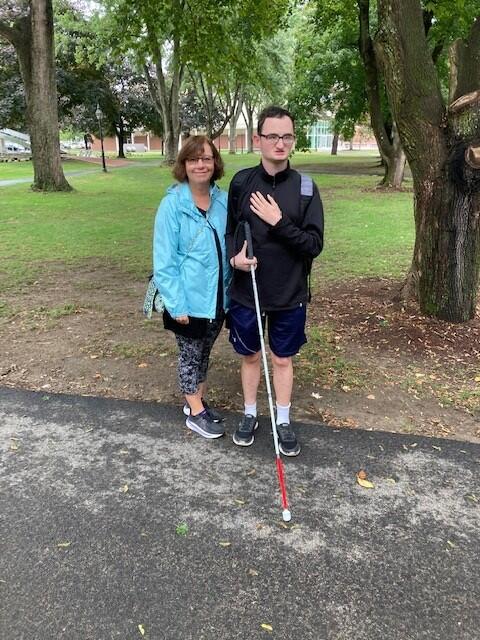- Massachusetts Commission for the Blind

By Mike Saccone, Tom Geraci
For more than four decades, Massachusetts Commission for the Blind (MCB) Certified Orientation and Mobility Specialist (COMS) Grace Cummings has helped consumers build confidence and independence as they navigate the world around them with their white canes.
Fresh out of college with a degree in social work, Grace started as a case manager at MCB in 1970. In 1980, she enrolled in UMass Boston’s newly launched Orientation and Mobility (O&M) program and became a COMS two years later. She then transitioned to MCB’s O&M department where she has worked for the past three decades.
“O&M instructors have a big impact on the consumer no matter their age,” Grace said in an interview with MCB intern Tom Geraci. “The consumer can’t go to school or get a job without the sense of independence they get from their O&M instructors first.”
Grace often works with adults who are experiencing vision loss for the first time. Giving them support and encouragement, along with time to grieve their vision loss, is critical to their success in incorporating a white cane into their daily routine.
“Sometimes a consumer tell me they’re just not ready, but six months later they call and say they’re ready for the next step,” she said.
She tries to get the consumer to focus on what they can do to change their mindset.
“In the beginning stages of experiencing this trauma of vision loss, they often think they won’t be able to do things they once used to,” she said. “I’m teaching them to look outside what they’ve always been comfortable with and think of how they can use their white cane to accomplish the same tasks.”
For new consumers, Grace first tries to explain and let them experience the sense of independence they can get from using a white cane. She starts slowly – up and down their basement stairs, a casual walk to the mailbox or a stroll around their neighborhood.
Many of the consumers she works with are older. In addition to vision loss, they’re often coping with other challenges that comes naturally with age – such as hearing loss, health issues and a lack of independence.
“For them, you must be extremely supportive and listen as they grieve,” she said. “They may have always driven themselves around and now I’m telling them to walk or take the bus.”
Grace said compassion and kindness go a long way. By listening to what the consumer has to say, she hopes they’ll feel more secure in taking their cane and doing mobility training with her.
“You have to really listen to understand where the consumer is coming from so you can help them get to where they want to go,” she said. “Everyone has a story to tell. I want to hear what got them to this point.”
She tries to make mobility fun, so consumers enjoy their lessons and want to keep learning.
“You can pick places they want to eat, coffee shops, the library, shopping malls,” she said. “The lessons don’t just have to be up and down the street learning their cane skills. They can be what is our next adventure going to be, especially with younger people to keep them engaged.”
She also incorporates new technology in her lessons, especially with younger people.
“Most students have smart phones, so once they get good cane skills down, I encourage them to familiarize themselves with navigational apps to give themselves the added confidence to go out in public with their cane,” she said.
Her job is never done.
“I’ve had consumers boomerang in and out of my life,” she said. “Over the course of 30 years, I’ve had them call me for help acclimating when they moved to a new home or had changes in their vision loss. Once you’re registered with MCB, you can always get services.”
Part of MCB’s mission is connecting consumers with employment opportunities, which the O&M department has a big role.
“In addition to helping consumers get acclimated to their new workplace and locate the entrances, exits, bathrooms and fire escapes, we also give their co-workers an overview on how to be a sighted guide,” Grace said. “All of this makes everyone more confident.”
This White Cane Awareness Month, she hopes to raise public awareness about the white cane and blindness in general.
“The most important thing is for people to cross the street with less risk,” she said. “Our consumers use the white cane to let drivers know they’re blind or visually impaired.”
She encourages all her consumers to join the disability boards and committees in their cities and towns to bring awareness about blindness and vision loss so they can help make their communities safer and more accessible for everyone.
As she gets ready to enter the retirement later this month, Grace reflects fondly on her time at MCB.
“The team has always been a supportive group,” she said. “The people of Massachusetts are very lucky to have MCB and their staff who are dedicated to helping people. Kudos to MCB for getting out there, seeing people where they’re at and helping them move forward.”
Grace is looking forward to spending more time with her family, including her husband and two adult sons
